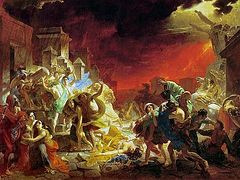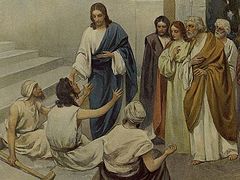The Giver of light, being Light from Light,
Thou givest eyes to the man born blind, O Word.
On this day, the sixth Sunday after Pascha, we are celebrating the miracle of the Lord and our Savior Jesus Christ, performed over a man born blind. This miracle, like the ones with the Samaritan woman and the paralytic, was performed with the help of water. It happened as follows. When Christ, while speaking with the Jews, declared Himself equal to God the Father and said, Before Abraham was, I am (Jn. 8:58), they took up stones to stone Him.
Having retired from there, He saw a stumbling blind man, who was born like this, having only the outlines of eyes and cavities instead of them. So, when the Savior met him in this state, the disciples wondered: Master, who did sin, this man, or his parents, that he was born blind? (Jn. 9:2), for they had heard Him say to the paralytic, Behold, thou art made whole: sin no more (Jn. 5:14), and had heard that He… recompensest the iniquity of the fathers into the bosom of their children after them (Jer. 32:18). In addition, the Epicurean opinion prevailed among some Jews that the souls pre-exist before the birth of the bodies, and those souls who sinned in a bodiless form are sent to the earth. Rejecting all such beliefs, Christ said: Neither hath this man sinned, nor his parents: but that the works of God should be made manifest in him (Jn. 9:3). By “works of God” He meant, “My works”. For here He was not talking about God the Father, since the phrase “so that” indicates a judgment, not a reason.
Having said this, Christ spat on the ground, made clay of the spittle and anointed where the blind man’s eyes were supposed to be with clay, and sent him to wash in the pool of Siloam in order to show that He was the One Who, at the very beginning, took dust from the earth and created man. And since the eye is the most important thing in the body, He created it from nothing, thereby showing that He also gives movement to the force of the soul. He used spittle, not water, so that it would be clear that the grace–giving power came from His spittle, not from water, and because He also intended to send the blind man to Siloam. He told him to wash there so that no one would attribute the healing to the local earth and clay. So He sent him to Siloam, to the numerous witnesses of the healing, because he would meet many as he walked with his eyes anointed with clay. Some say that even after washing, the blind man did not remove the clay from his eyes, but that clay itself changed its nature when it came into contact with water in such a way that his eyes were formed.
The word “Siloam” in Hebrew means “sent” (Jn. 9:7), because that pool was located outside Jerusalem. Under Hezekiah, whenever the enemies besieged the city and captured Siloam, the water rushed away from there. And as long as those inside the city did not dig wells and drainage ditches, whenever someone was sent there at the behest of the Prophet Isaiah, the water immediately came out and could be drawn. But if someone came of his own accord or if the enemy came, the flow would stop. And it had been like that ever since. Therefore, wishing to show that He was from God, Christ sent the blind man there, who immediately received his sight. According to some, Siloam was named for the sake of today’s blind man sent by Christ.
So, the blind man who washed himself was healed by some ineffable power, but the sufferer himself did not fathom that mystery. Seeing him see for no obvious cause, his neighbors and acquaintances were in doubt. He said that he had been blind before, and when asked about the cause of his healing, he declared Christ to be the Healer of his illness. Once the Pharisees heard about such a wonderful miracle, they blasphemed the Savior again for not observing the Sabbath, because the miracle had been performed, according to the custom of Christ, on the Sabbath day. There was a division between them: Some, considering the miracles that had occurred, said that Jesus was from God, while others argued that He was not from God, since He did not keep the Sabbath. Those who had a good opinion of Jesus asked the blind man: What sayest thou of Him? (Jn. 9:17). He proclaimed Him a Prophet, which was the most honorable thing for them. But they still didn't believe that Christ had healed the man born blind. Not trusting the man’s neighbors, the Pharisees naturally sent for his parents. But the more they wanted to hide it in the shadows, the more they brought it to light, since his parents, too, admitted everything—although they cited his age so as not to be expelled from the synagogue. And again they said to the blind man: Give God the praise (Jn. 9:24). For, as they believed, the healing was from God, not from Christ. The latter, they believed was a “sinner”, because He had broken the Sabbath. But the man, wishing to show in practice that Christ is God, answered, Whether he be a sinner or no, I know not: one thing I know, that, whereas I was blind, now I see (Jn. 9:25). The Pharisees asked him again: What did He to thee? how opened He thine eyes? (Jn. 9:26). And the man, vexed, no longer spoke by hints, but entered into an argument with them: If this man were not of God, He could do nothing (Jn. 9:33). And he heard reproaches from the Pharisees for declaring himself a disciple of Jesus and for saying, Since the world began was it not heard that any man opened the eyes of one that was born blind (Jn. 9:32), for others had healed the blind, but none had ever healed someone blind from birth. So, having ridiculed him, they kicked him out of the synagogue.
After that, Jesus found him and said: Dost thou believe on the Son of God? (Jn. 9:35). But when he learned that this was the One Who had spoken to him and saw Christ (for he had not seen Him before due to his blindness), he worshiped Him and became His disciple, preaching everywhere the good deed that had been done to him.
We can also imagine it allegorically. “The blind man” signifies the Gentiles whom Christ found while passing (cf. Jn. 9:1)—that is, on earth, and not in Heaven; or because He came for the sake of the Jewish people and, “while passing”, appeared to the Gentiles, and spitting on the ground and making “clay”, He “anointed” them (cf. Jn. 9:6)—that is, he first taught them. For He descended like a drop to the earth and was incarnate of the Virgin Mary, and after that he taught Divine Baptism, which is Siloam. Further, [the same blind man is] the Christian people from among the Gentiles, bold before all for Christ's sake, persecuted and witnessing, and finally recognized and glorified by Him [as His people].
By Thy boundless mercy, O Giver of light, O Christ our God, have mercy on us and save us. Amen.
Kontakion of the Sunday of the Blind Man, tone 4:
I come to Thee, O Christ, blind from birth in my spiritual eyes, and I call to Thee in repentance: Thou art the most radiant light of those in darkness!





